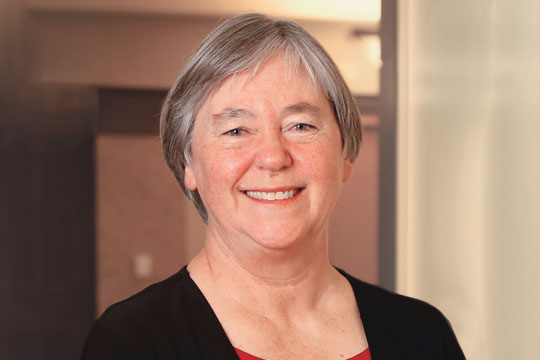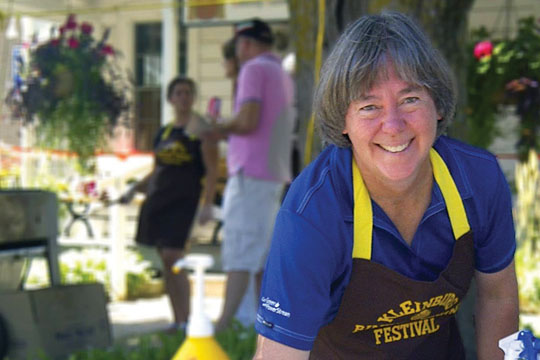
Deb Schulte may be new to cabinet, but she is not a rookie about seniors’ issues, having founded the special interest Liberal seniors' caucus.
When Deb Schulte was sworn in as Canada’s minister of seniors in November 2019, she was among eight newcomers to cabinet. But the Toronto-area MP is no rookie when it comes to seniors’ issues.
Elected for the first time in 2015, the MP for Vaughan-King City immediately got busy making her mark on Parliament Hill. Within five months of becoming an MP, she was the founding chairwoman of the influential special-interest Liberal seniors' caucus.
As a local and regional councillor from 2010 to 2014 in the city of Vaughan, north of Toronto, and York Region respectively, Schulte was well aware of the issues facing seniors — from home care to housing.
“I know the three levels of government have to work together to provide for seniors,” she says. “So having that background is very helpful.”
According to Statistics Canada, 17 per cent of the Canadian population is older than 65, and that demographic is forecast to grow to 26 per cent early in the next decade. The average Canadian life expectancy has grown by 30 years over the last century and there are now more senior citizens than children in Canada. It all adds up to seniors becoming a hot political issue in the next election and beyond.
Schulte saw the creation of a seniors' caucus as an opportunity to come up with solutions to things she saw as a municipal councillor.
To those familiar with Parliament Hill, committees and special interest caucuses are what make the place run. With the beginning of each Parliament, government and opposition MPs are assigned to standing committees of the House of Commons on matters crucial to a functioning government, such as finance, transport, foreign affairs, health and others.
Standing committees are where issues are hashed out, recommendations are made and pending legislation is reviewed before being passed on the floor of the Commons.
For MPs with the extra energy and inclination, there are special-interest caucuses, which they attend on their own time. These groups have no official status, but are frequently influential behind the scenes.
Governments in the past have relied on special-interest caucuses to develop policy, but they played an especially important role in the Trudeau government’s first term.
The Liberal seniors‘ caucus is a prime example. One night a week, while the House was sitting, a couple of dozen MPs from across the country would meet to develop proposals to improve the lives of older Canadians. They would frequently invite stakeholder groups such as the National Association of Federal Retirees to make presentations on how government policy can be improved.
As a local and regional councillor from 2010 to 2014 in the city of Vaughan, north of Toronto, and York Region respectively, Schulte was well aware of the issues facing seniors — from home care to housing.
In fact, Schulte credits Federal Retirees for much of the input in the reports this informal group made over three years to the national Liberal caucus. A key recommendation was the creation of a cabinet portfolio dedicated to seniors — something for which Federal Retirees had been lobbying hard, and an initiative that became a reality.
In August 2018, Prime Minister Justin Trudeau announced that Hamilton MP Filomena Tassi would be Canada’s first seniors minister. When a new cabinet was sworn after the 2019 election, Tassi moved on to become minister of labour and the prime minister looked to Schulte to assume the seniors post.
That gave Schulte the distinction of holding a cabinet post she had a big hand in creating. “I’m in a position now to implement many of the things the [seniors'] caucus recommended.”
It’s an outcome that did not come by accident.
Federal Retirees will be a key stakeholder to which Schulte will be looking for advice as minister, she says. In fact, one of her first telephone meetings after being sworn in to cabinet was with Federal Retirees president Jean-Guy Soulière.
Much of what was in the Liberals’ 2019 election platform came from the seniors' caucus, Schulte notes.
The platform that got the Trudeau government re-elected last autumn included important things of interest to seniors. First, there was a 10-per-cent increase to Old Age Security (OAS) benefits starting at age 75. The measure would put up to $729 more a year in the pockets of most older Canadians and help lift 20,000 seniors out of poverty, the government says. Second, was a boost to Canada Pension Plan (CPP) benefits for widows and widowers by 25 per cent. The change, which would have to be negotiated with the provinces and territories, would be worth up to $2,080 a year in additional benefits.
Federal Retirees will be a key stakeholder to which Schulte will be looking for advice as minister, she says. In fact, one of her first telephone meetings after being sworn into cabinet was with Federal Retirees president Jean-Guy Soulière.
“It was an incredible three years,” she says of the seniors' caucus. “A lot came out of it.”
She also gained valuable experience during that first term by being named parliamentary secretary to the revenue minister, a post that gave her a non-voting membership on the powerful finance committee.
Aside from filling in when the minister is unable to be in Question Period, it is the job of a parliamentary secretary to be the government’s eyes and ears at standing committees. Coupled with her knowledge of seniors’ issues, her experience watching proceedings at finance committee on the government’s behalf gave her great insight on how spending priorities are set — excellent preparation to get things done as seniors minister.
“I am very excited about the future as well as the work we have to do,” Schulte said during a recent interview.
About the last thing Schulte expected to be when she graduated from Princeton University in engineering was a key player in the evolution of Canada’s seniors’ policy.
In fact, before politics, she spent 22 years in the aerospace industry, including work on the Dash-8 commuter jet in 1982. “It would never have occurred to me that I would apply knowledge of engineering and problem-solving to community problems,” she says.

Schulte: “The levels of government have to work together to provide for seniors.” Credit: Courtesy of the Office of Minister Schulte
It wasn’t until after her two sons were born that she began to view community issues such as seniors' care with the problem-solving instincts of a professional engineer. She will also likely need those problem-solving instincts as seniors minister.
In the mandate letter the prime minister sent her before Christmas, there is a long to-do list for the government’s second term.
Aside from the two things from the election platform — the OAS increase and the top-up to CPP survivors’ benefits — the new seniors minister is being asked to work with the ministers of health and finance to deliver pharmacare, work toward elimination of elder abuse, deliver programming such as a national seniors council and work on issues such as healthier aging and housing for seniors.
At the best of times, that’s a tall order. But since the voters last fall reduced the Liberals’ standing in the Commons to a minority — meaning opposition parties can force another election at any time — that’s a towering mandate.
Not surprisingly, perhaps, Schulte politely bridges to a philosophic answer when asked about timelines.
Just as she learned to see things through an engineer’s instinct for problem-solving, Schulte has learned something from her municipal days — the power and necessity of intergovernmental co-operation. You need to have partners to get things done.
“Obviously, we don’t have a crystal ball,” she says. “So the intention is to do as many things as we can.”
Pharmacare alone will be a tough slog since health delivery is a provincial responsibility and several provinces, such as Ontario, don’t like it.
When the federal government introduced national medicare in 1968, just two provinces — Saskatchewan and British Columbia — signed on as participants. It wasn’t until 1972 that all provinces became full participants in Canada’s public health-care program.
Pharmacare will likely evolve the same way. Schulte believes there are enough people willing to keep “chipping away” at this and other initiatives affecting seniors for ultimate success.
“There is already quite a lot done,” she says, naming bolstering the CPP and developing of a national dementia strategy as examples during the Liberals’ first term.
“There is an evolution… we are in a good place in Canada,” she says. “We have a good safety net.”
Canadians should be very proud of what has been accomplished so far, she says, just as they will be proud of what will be accomplished.
“I’m in a position now to implement many of the things the [seniors'] caucus recommended.”
Just as she learned to see things through an engineer’s instinct for problem-solving, Schulte has learned something from her municipal days — the power and necessity of intergovernmental co-operation. You need to have partners to get things done.
“I know the levels of government have to work together to provide for seniors.”
Building those partnerships, particularly though the Federation of Canadian Municipalities, will be an important priority. She will also be looking for bipartisan support because the NDP and others had some progressive items in their election platforms.
Toward the end of an interview, Schulte asks to get something off her chest. “The thing that I find disappointing when I knock on doors is that people really don’t know what we do.”
The problem is that efforts of so many on Parliament Hill go unnoticed, or simply unreported.
“It’s not just the work of the (Prime Minister’s Office),” she says. “It’s also the work of the caucus.”
In 1969, then-prime minister Pierre Trudeau quipped that MPs were nobodies 50 feet from Parliament Hill. Deb Schulte is determined to prove the father of the current prime minister wrong.

